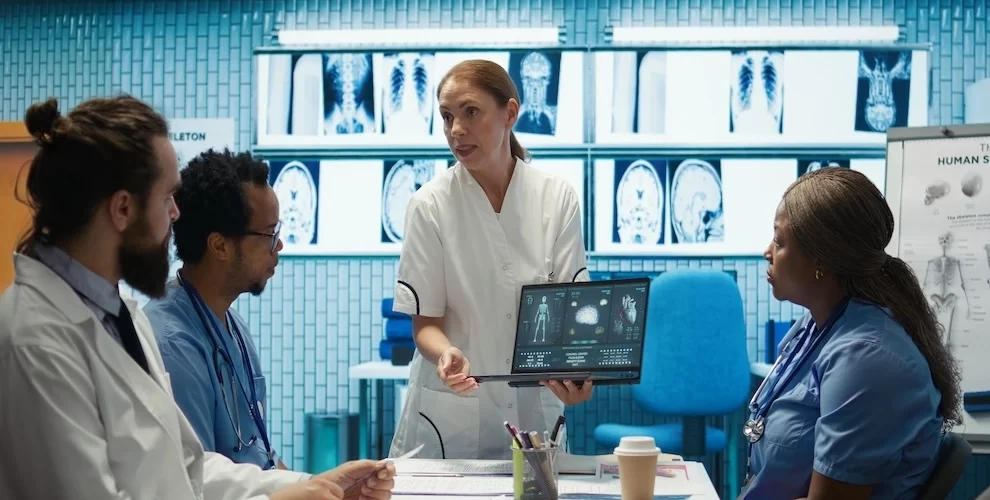
5 Best AI Use Cases in Healthcare: Real-World Impact
Table of Contents
Introduction
Artificial Intelligence (AI) is revolutionizing every industry, but few stand to benefit from it as much as healthcare. From diagnosing diseases more accurately to creating cutting-edge treatment plans, AI is saving lives while shaping the future of medicine. Its real-world impact is being felt across various domains, offering unprecedented results where traditional healthcare approaches often fell short.
This blog explores the best AI use cases in healthcare, shedding light on how these innovations are improving diagnostics, personalizing treatment, streamlining operational efficiencies, and reshaping drug development. We’ll also examine the challenges and ethical considerations that come with AI adoption.
By the time you finish reading, you’ll have a comprehensive understanding of how AI is transforming modern healthcare and what lies ahead.
What is Artificial Intelligence (AI)?
Artificial Intelligence (AI) refers to the simulation of human intelligence in machines that are programmed to think and act like humans. It involves creating intelligent systems that can learn, reason, and make decisions on their own. AI utilizes advanced technologies such as machine learning, natural language processing, and computer vision to analyze data, recognize patterns, and make predictions.
AI Use Cases in Healthcare
AI has immense potential in transforming healthcare by providing advanced tools for diagnosis, treatment planning, drug discovery, the drug development process, and patient care management. Let’s look at some of the most promising cases of artificial intelligence in healthcare.
1. Transforming Diagnostic Accuracy with AI
Artificial Intelligence is making significant strides in healthcare, particularly in disease diagnosis, by dramatically improving accuracy and enhancing patient safety. Medical errors, which often lead to complications or fatalities, are being reduced as AI algorithms provide precise diagnostic insights with the support of human oversight.
Take radiology, for example. AI-powered tools can analyze medical imaging, such as X-rays, MRIs, and CT scans, with meticulous detail. Google Health’s DeepMind, for instance, developed an AI model for identifying breast cancer in mammograms. Studies show it performs as well as, and sometimes better than, human radiologists in detecting cancerous lesions.
Furthermore, AI is excelling in areas like pathology, cardiology, and dermatology, where it helps identify abnormalities that the human eye could have easily overlooked. Its quick and accurate analysis is paving the way for faster and more reliable outcomes, cutting down unnecessary delays in treatment.
Real-World Impact:
- Algorithms like IBM Watson and Aidoc support clinicians in diagnosing strokes, cancers, and other critical conditions in record time.
- AI has reduced diagnostic errors and enhanced the ability to detect diseases in their earliest, most treatable stages.
2. Personalized Treatment Plans Powered by AI
When it comes to an individual’s health, there’s no one-size-fits-all solution. AI enables highly personalized treatment plans that take into account a patient’s medical history, genetic profile, and even lifestyle.
For instance, platforms like Tempus leverage massive datasets for genomics and clinical data to offer personalized oncology treatments. Similarly, AI tools equipped with machine learning analyze patient information to predict outcomes and recommend customized care strategies, ensuring therapies are tailored to achieve the best possible results.
By moving beyond standardized methods, AI is enhancing population health by focusing on what works best for each individual. This personalized approach is especially effective in complex areas such as cancer treatment, rare diseases, and chronic illness management, delivering better health outcomes across diverse patient groups.
Real-World Impact:
- AI enables tailored chemotherapy regimens focused on a patient’s DNA profile.
- ML models are helping predict the efficacy and potential side effects of treatments on a specific patient.
3. Accelerating Drug Discovery with AI
Drug discovery has historically been an expensive and time-consuming process, often taking over a decade (and billions of dollars) to develop a new medication. However, AI is revolutionizing this field, making drug discovery faster, more affordable, and more effective.
By analyzing vast datasets of chemical compounds, biological data, and clinical outcomes, AI can predict potential drug candidates with higher accuracy. For instance, Insilico Medicine’s AI platform identified a new drug candidate for fibrosis within 46 days, a task that usually takes years. Similarly, Google’s DeepMind has developed an AI system like AlphaFold that can predict protein structures and accelerate drug design.
Real-World Impact:
- Faster identification of potential drug candidates reduces the cost of research and brings treatments to market more quickly.
- AI-driven modeling decreases the dependency on trial-and-error methods, streamlining clinical trials.
4. Revolutionizing Remote Patient Monitoring
The growing need for accessible healthcare has driven widespread adoption of AI in remote patient monitoring. Wearable devices and mobile apps now track real-time patient data, providing actionable insights to both patients and healthcare providers.
For example, wearable devices like Fitbits and Apple Watches monitor vital signs, such as heart rate, sleep patterns, and oxygen levels, with AI flagging any anomalies.
Another example is of an AI-enabled platform, Biofourmis, that can detect changes in a patient’s condition before symptoms worsen, allowing for proactive care rather than reactive treatments. This fosters a new level of preventative healthcare, enabling early interventions and reducing hospital readmissions.
Real-World Impact:
- Remote monitoring saves time, improves patient convenience, and reduces strain on hospital staff.
- AI enables the management of chronic diseases, like diabetes and hypertension, by providing consistent real-time data.
5. Improving Operational Efficiency in Healthcare
Healthcare providers and organizations are often burdened by administrative tasks that can detract from patient care. AI is stepping in to overhaul these operations, driving efficiency and reducing burnout among healthcare professionals.
For instance, AI-powered tools can automate appointment scheduling, optimize staff allocation, and streamline billing. At the same time, Natural Language Processing (NLP) algorithms simplify the management of electronic health records by automating transcription. Platforms like Olive AI integrate electronic health data into workflows, enhancing operations and reducing administrative overhead.
Additionally, virtual health assistants and AI tools are advancing medical diagnosis, allowing healthcare professionals to focus more on delivering quality care to patients.
Real-World Impact:
- AI provides predictive analytics that helps manage hospital inventory and avoid supply shortages.
- Process automation allows healthcare professionals to focus on patient care, improving outcomes and satisfaction.
Addressing Challenges and Ethical Considerations
Despite its numerous advantages, AI in healthcare faces hurdles that must be addressed for sustainable integration.
Key Challenges:
- Data Privacy: AI models require large datasets, which raises concerns about patient privacy and potential data breaches.
- Bias in Algorithms: Training data can sometimes contain bias, leading to healthcare disparities.
- Regulatory Scrutiny: AI systems must comply with strict regulations to ensure they are safe and accurate for use in critical healthcare applications.
Ethical Considerations:
- Patient Consent: Ensuring patients are informed about the use of AI in their healthcare decisions.
- Impact on Jobs: While AI improves efficiency, there are concerns about its potential to displace healthcare workers.
- Accountability: Determining liability in cases where AI provides inaccurate recommendations or overlooks key concerns.
Addressing these issues is critical to building trust and ensuring equitable, transparent AI adoption.
Learn AI with ONLC
Understanding artificial intelligence is becoming increasingly important in today’s rapidly evolving world. Whether you’re a healthcare professional looking to integrate AI into your practice or simply curious about the potential of AI in various industries, ONLC offers comprehensive courses to meet your needs.
With expert instructors and flexible learning options, ONLC provides the perfect opportunity to build your AI knowledge and skills. With an AI training course, you’ll gain valuable insights into AI technologies, ethical considerations, and practical applications, equipping you to stay ahead in this transformative field. Explore our AI certification courses today and take the first step toward a future shaped by innovation.
- Introduction to Generative AI: Using Best of Breed AI Products
- Using DALL-E 3 for Image Generation
- Build Plugins and Connectors for Microsoft Copilot for Microsoft 365
- PL-400: Microsoft Power Platform Developer
- Explore All Courses
FAQs
How is AI transforming the healthcare sector?
AI is revolutionizing healthcare by enhancing efficiency, reducing healthcare costs, and improving patient outcomes. It simplifies administrative tasks, enhances diagnostic accuracy, and powers innovative treatment methods. By transforming how care is delivered, AI is paving the way for a more effective and accessible future in healthcare.
How can medical professionals leverage AI in clinical decision-making?
AI can analyze vast amounts of medical data to support clinical decision-making by highlighting patterns, suggesting treatment plans, and predicting potential health risks. This allows medical professionals to make informed decisions, optimize treatment strategies, and enhance clinical practice.
Can AI help address mental health challenges?
Yes, AI solutions are playing a significant role in mental health care by enabling early detection of mental health conditions, delivering personalized therapy through chatbots, and offering tools for better management of mental health disorders. These advancements positively impact healthcare delivery for mental health patients.
How does AI contribute to reducing healthcare costs?
By automating routine administrative tasks, improving diagnostic accuracy, and predicting disease progression, AI solutions help reduce overall healthcare costs. These efficiencies save time and resources for both medical professionals and patients in the healthcare industry.
What role does computer science play in AI solutions for healthcare?
Computer science underpins the development of AI solutions by providing the algorithms, data processing, and machine learning models necessary for analyzing large datasets and delivering actionable insights. This helps improve clinical practice and enables innovative applications across the healthcare sector.
What is the role of an AI specialist in healthcare?
An AI specialist in healthcare designs, develops, and implements artificial intelligence solutions to address complex medical challenges. Their role involves working with large datasets, creating predictive models, and collaborating with healthcare professionals to ensure AI systems are accurate, efficient, and aligned with clinical needs. AI specialists also research emerging technologies, ensuring innovations comply with ethical standards and regulations in the healthcare sector.
Are there specific examples of AI improving healthcare delivery?
AI has been used to enhance imaging diagnostics, optimize patient management, and assist with developing personalized medicine. These real-world applications demonstrate how AI improves healthcare delivery and benefits patients and medical professionals alike.
Pioneering a New Era in Healthcare
The integration of AI in healthcare represents a seismic shift in how medical services are delivered, tailored, and accessed. It is tackling some of the industry’s most pressing challenges, from diagnostic accuracy to operational inefficiencies, delivering powerful solutions that benefit both patients and providers.
As we continue to innovate, the future of AI in healthcare looks even more promising. Overcoming challenges like ethical concerns and system biases will set the stage for smarter solutions and a more inclusive global healthcare system.
Are you ready to see how technology can transform your field and help improve patient outcomes? Start exploring AI-powered possibilities today. Sign up for our AI courses and join the ranks of healthcare professionals driving the future of medicine. Together, we can create a healthier world for all.





